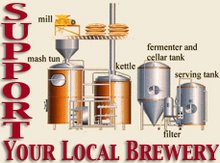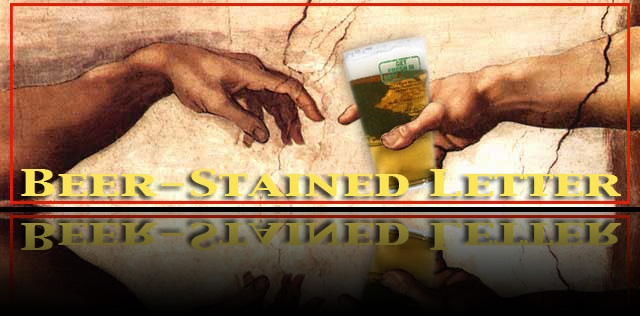 How do you make a big imperial beer when your business model is dedicated to making accessible beers that invite Bud, Miller and Coors Light drinkers to step up to craft brews, but also promise not to overwhelm?
How do you make a big imperial beer when your business model is dedicated to making accessible beers that invite Bud, Miller and Coors Light drinkers to step up to craft brews, but also promise not to overwhelm?
That's the challenge for Cricket Hill Brewing, as it works to replicate a brew the Fairfield beer-maker crowned the winner in a homebrew contest it sponsored last year. CH has pulled off big-yet-accessible brews in the past with some beers made to celebrate brewery milestones.
Founder Rick Reed (pictured applying an instant Cricket tattoo on festival-goer) says the brewery will do that again with homebrewer Bill Kovach's recipe for a Russian imperial stout. The specialty brew isn't due until January 2012, but test batches are already being produced. Rick took some time at the Philly Craft Beer Festival this past weekend to talk about the stout and how the beer landscape in New Jersey has changed since Cricket Hill opened its doors 10 years ago.
BSL: You've done bourbon barrel and cask beers, a barley wine ... they were higher-alcohol beers.
RR: Only 8 percent, even the barley wine was only 8 percent. We did it as a signature for our 500th brew, and we kept it at 8 percent, low-balled the alcohol because we're trying to do gateway beers.
BSL: So even though you're doing an imperial stout, you're going to keep to your traditional approach?
RR: We going to try to keep the alcohol as low as we can, as long as we get the full flavor. If that means the alcohol goes up, then it has to. The homebrewer (who had) the winning recipe, we've altered it to his satisfaction. We've done two different pilot brews with the modifications – he used some (malt) extract, and we won't do that. We're having some preliminary tastings ... it's very, very good, and it looks like the alcohol is going to be held down.
BSL: What kind of range, 8 percent like the barley wine?
RR: Eight percent, yeah. We're also doing some small-batch stuff with the second, third and fourth-place winners. One is an imperial IPA; one's an American pale ale, and the other's a dubbel.
BSL: And again you're dialing it down in that Cricket Hill style of making an accessible beer that still has craft qualities?
RR: We consider it the gateway philosophy. We're trying to get the Coors, Miller and Bud drinkers of New Jersey – and there's still plenty of them, only the lord knows why – to come over to an all-malt without getting scared off. In a perfect world, if you're a beer geek, and somebody says, "I want to try a new style," you say, "Try Cricket Hill first, they'll show you what it can taste like without overwhelming you." And from there, you can go hog wild.
BSL: You guys have been at it for 10 years now. Do you feel like you've carved out a niche?
RR: We're comfortable now. If things continue the way they have over the last year and half, we're going to be very comfortable. New Jersey's accepting craft beer now with open arms. Our (brewery) tours, we're averaging 100-plus people every Friday. Our sales are up over 50 percent from the year before and the last two years.
BSL: What about your volume?
RR: This year we think were going to hit just over 2,000 barrels. For a brewery our size, that's really amazing. We lend ourselves to draft; for a small brewery, 50 percent of our beer is draft, 50 percent is bottles. Usually it's 80-20, bottles to draft.
BSL: Is your East Coast Lager still your top beer?
RR: Yep.
BSL: What's No. 2?
RR: I would bet No. 2 is the IPA (Hopnotic IPA). It's amazing, because no matter where you go and do these shows, they either love IPA or don't drink it. In Pennsylvania, they're IPA freaks, and Stockertown (Beverage, a CH distributor) sells a lot of it for us. We're the official beer of the Philly Roller Girls (roller derby team) and they take the lager and the IPA, until the Summer (Breakfast Ale) comes one, and then they take the Summer. The lager's also in some minor league baseball clubs.
BSL: You've also been a friend, lent support to the newcomers on the Jersey beer scene, New Jersey Beer Company in North Bergen and Port 44 Brew Pub in Newark ...
RR: It's a tight community. The more the merrier.
BSL: Beer in New Jersey is dramatically different than it was, even just four years ago. Talk about that.
RR: When I first got in this business, New Jersey really had nothing. It had microbreweries that were selling their beer anywhere but New Jersey. Flying Fish was selling their beers in Philadelphia; you had River Horse selling in Pennsylvania and New York; you had Ramstein selling in upstate New York, because New Jersey's a fickle marketplace.
We've been banging our heads against the wall, all of us breweries, and now New Jersey is coming around. New Jersey is a very hot marketplace; you can tell because all the little breweries from across the country are trying to get into New Jersey because they see it perking up and coming alive.





















